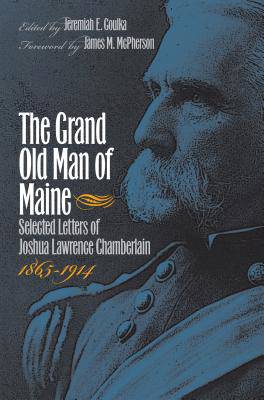
Bedankt voor het vertrouwen het afgelopen jaar! Om jou te bedanken bieden we GRATIS verzending (in België) aan op alles gedurende de hele maand januari.
- Afhalen na 1 uur in een winkel met voorraad
- In januari gratis thuislevering in België
- Ruim aanbod met 7 miljoen producten
Bedankt voor het vertrouwen het afgelopen jaar! Om jou te bedanken bieden we GRATIS verzending (in België) aan op alles gedurende de hele maand januari.
- Afhalen na 1 uur in een winkel met voorraad
- In januari gratis thuislevering in België
- Ruim aanbod met 7 miljoen producten
Zoeken
The Grand Old Man of Maine
Selected Letters of Joshua Lawrence Chamberlain, 1865-1914
€ 61,45
+ 122 punten
Omschrijving
Best known as the hero of Little Round Top at Gettysburg and the commanding officer of the troops who accepted the Confederates' surrender at Appomattox, Joshua Lawrence Chamberlain (1828-1914) has become one of the most famous and most studied figures of Civil War history. After the war, he went on to serve as governor of Maine and president of Bowdoin College. The first collection of his postwar letters, this book offers important insights for understanding Chamberlain's later years and his place in chronicling the war.
The letters included here reveal Chamberlain's perspective on military events at Gettysburg, Five Forks, and Appomattox, and on the planning of ceremonies to celebrate the fiftieth anniversary of Gettysburg. As Jeremiah Goulka points out in his introduction, the letters also shed light on Chamberlain's views on politics, race relations, and education, and they expose some of the personal difficulties he faced late in life. On a broader scale, Chamberlain's correspondence contributes to a better understanding of the influence of Civil War veterans on American life and the impact of the war on veterans themselves. It also says much about state and national politics (including the politics of pensions), family roles and relationships, and ideas of masculinity in Victorian America.
The letters included here reveal Chamberlain's perspective on military events at Gettysburg, Five Forks, and Appomattox, and on the planning of ceremonies to celebrate the fiftieth anniversary of Gettysburg. As Jeremiah Goulka points out in his introduction, the letters also shed light on Chamberlain's views on politics, race relations, and education, and they expose some of the personal difficulties he faced late in life. On a broader scale, Chamberlain's correspondence contributes to a better understanding of the influence of Civil War veterans on American life and the impact of the war on veterans themselves. It also says much about state and national politics (including the politics of pensions), family roles and relationships, and ideas of masculinity in Victorian America.
Specificaties
Betrokkenen
- Uitgeverij:
Inhoud
- Aantal bladzijden:
- 384
- Taal:
- Engels
- Reeks:
Eigenschappen
- Productcode (EAN):
- 9781469614700
- Verschijningsdatum:
- 1/03/2014
- Uitvoering:
- Paperback
- Formaat:
- Trade paperback (VS)
- Afmetingen:
- 152 mm x 229 mm
- Gewicht:
- 521 g

Alleen bij Standaard Boekhandel
+ 122 punten op je klantenkaart van Standaard Boekhandel
Beoordelingen
We publiceren alleen reviews die voldoen aan de voorwaarden voor reviews. Bekijk onze voorwaarden voor reviews.








